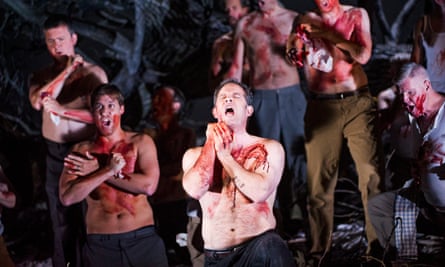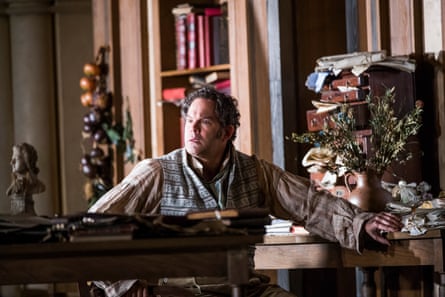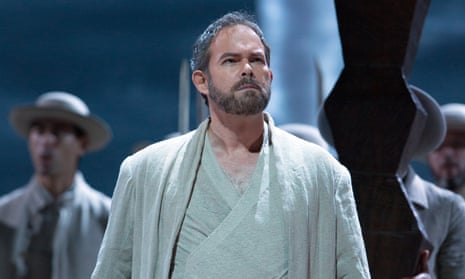The word “warm” comes up frequently in descriptions of the bass-baritone Gerald Finley. And rightly so. The Canadian singer and actor brings a generous and affecting lyricism to every role he touches, whether it’s the Robert Oppenheimer of John Adams’s Doctor Atomic, or else Rossini’s Guillaume Tell, which he is singing this season at New York’s Metropolitan Opera.
And Finley has emotionally resonant skills as an actor, too, whether he’s channeling the dark humor of Stravinsky’s The Rake’s Progress or communicating the austere longing of Kaija Saariaho’s L’amour de loin. Even when he finds himself in the middle of an operatic uproar – as happened with last year’s Royal Opera House production of Tell – Finley’s performances are often judged the best part of the show.
So it’s with some surprise that I discover Finley has never taken an acting class. “I’ve had to pick it up along the way,” he concedes during a morning in between performances at the Met. “You can tell the actors that stand there, and you go: Wow, they’re unbelievably active! Interesting to look at. And I thought: I really want to be that. I want to know that there’s things in my face, in my demeanor, in my posture, that convey uncertainty, desire, love, disappointment, confusion – all those things just by standing.”
He credits “some really great directors who have seeded things”. This group includes the late English director Robin Phillips, who took charge of Ontario’s Stratford Festival in the 1970s. “I was 32 or 31, doing Marriage of Figaro – and he staged it in an Edwardian style. We learned how you could do what he called ‘toasty turns’, where you’re warming yourself against your colleagues, when you take your turn. He said that gives a haughtiness and yet a sort of respect. Just simple techniques with your head … Those sort of things were wonderful anchor points for me as an actor.”

Finley’s opening night performance of the Tell role, in Pierre Audi’s new production, showed how much acting craft the baritone has absorbed over the years. Rossini’s epic dances past the four-hour mark (even with some slight cuts, at the Met). And there are long stretches where Tell doesn’t have much singing to do. But in Audi’s decadently gloomy and gently surreal production, Tell can often be seen haunting the edges of this or that grand choral outburst. And you can always observe the gears turning within Finley’s characterization, as the Swiss archer gradually prods himself into a state of active resistance against an Austrian occupation.
“The interesting thing is the relationship between Tell and his son,” Finely says. “For me, that’s the conflict that’s set up, from the very start: where life is crap, and my son is growing up and starting to use a crossbow – ready to get killed. So this is great! And as soon as Leuthold says ‘my only daughter has been taken from me’, that immediately strikes a chord in Tell … For me that’s like: ‘He’s killed a soldier for what he did to his daughter. Would I do the same?’ The answer is yes.”
The singer sounds a bit less interested in the famous archery trick that has lodged the Tell story in the pop-culture consciousness. “The apple moment? People can decide what expectation they have for that as the dramatic high point of the opera – and be completely disappointed. Or: ‘OK, that was good enough. Now what’s next?’ That’s still part of the drama. But for me it’s the emotional impact which is the key.” And for all his admirable focus on the complexities of the broader opera, Finley makes sure to provide a haunting rendition of Sois immobile.
He says his interest in longevity means turning down some roles that are now being offered to him. “The whole journey into Wagner – I’ve done three productions now of [Meistersinger]. And people say ‘ooh, it’s a slippery slope; you’ll get that big [wobble] trying to push it out over the orchestra’ … But it’s very instructive. Hans Sachs I found wonderful; it sits very happily in part of my voice. I would not probably do Sachs in houses as big as here. And that’s just a reality.
“There’s a lot of guys that can do Wotan … But I have other roles that I really want to manage; I want to make sure that I still get to do those. I’m looking forward to things like Scarpia. I don’t know if there’s a Gérard in [Andrea] Chénier for me? I would love to sing the aria! … As a result of singing Hans Sachs I’m singing much better in my higher range. Simply because of the stamina required to do that.”

Finley says that his 17 performances of the Sachs role, over the last year, tempts him into thinking that he can do anything – “but I still have to be sensible about it all.” He also notes that he’s not just a singer of opera. Along with the Los Angeles Philharmonic and conductor Gustavo Dudamel, Finley reunited with Saariaho back in 2015, for a concert piece called True Fire (which she wrote with him in mind).
“Kaija’s music can be contemplative – and you have to let yourself go into the experience of the music … But True Fire is some of her darker work. I’m doing it in London in December with the BBC Symphony, and also with the Hamburg Radio Orchestra, in June next year. And then recording it with the Helsinki Philharmonic … So I’m still doing my recital repertoire and my concert repertoire. I have three passions in my singing life, and I need to nurture all of them. But I’m really optimistic about the future, because I’ve had such a great technical ride in the last four or five years. Singing repertoire which hopefully isn’t beyond me. Getting to know great pieces – and now doing them in wonderful places. I’m feeling very fortunate.”
- Gerald Finley is in the Metropolitan Opera’s production of Guillaume Tell through 12 November

Comments (…)
Sign in or create your Guardian account to join the discussion